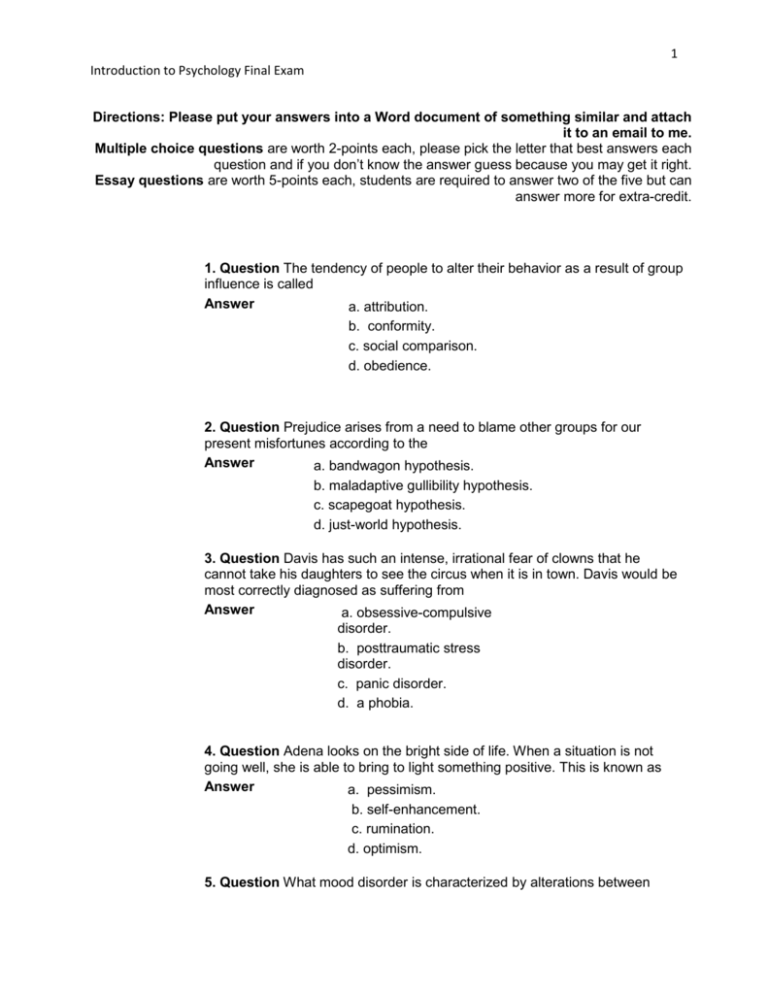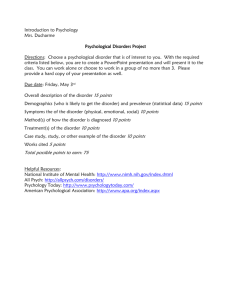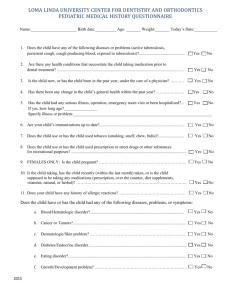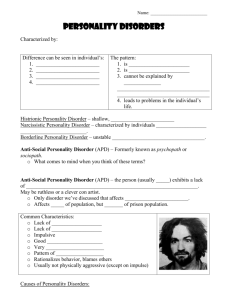Intro final fall 2010
advertisement

1 Introduction to Psychology Final Exam Directions: Please put your answers into a Word document of something similar and attach it to an email to me. Multiple choice questions are worth 2-points each, please pick the letter that best answers each question and if you don’t know the answer guess because you may get it right. Essay questions are worth 5-points each, students are required to answer two of the five but can answer more for extra-credit. 1. Question The tendency of people to alter their behavior as a result of group influence is called Answer a. attribution. b. conformity. c. social comparison. d. obedience. 2. Question Prejudice arises from a need to blame other groups for our present misfortunes according to the Answer a. bandwagon hypothesis. b. maladaptive gullibility hypothesis. c. scapegoat hypothesis. d. just-world hypothesis. 3. Question Davis has such an intense, irrational fear of clowns that he cannot take his daughters to see the circus when it is in town. Davis would be most correctly diagnosed as suffering from Answer a. obsessive-compulsive disorder. b. posttraumatic stress disorder. c. panic disorder. d. a phobia. 4. Question Adena looks on the bright side of life. When a situation is not going well, she is able to bring to light something positive. This is known as Answer a. pessimism. b. self-enhancement. c. rumination. d. optimism. 5. Question What mood disorder is characterized by alterations between 2 Introduction to Psychology Final Exam periods of extremely high levels and extremely low levels of activity? Answer a. A manic episode b. Major depressive disorder c. Bipolar disorder d. Seasonal affective disorder 6. Question ________ suggests that we start with a small request before asking for a bigger one. Answer a. The door-in-the-face technique b. The foot-in-the-door technique c. The low-ball technique d. The bait-and-switch technique 7. Question Drawing conclusions about a person, group of people, or situation prior to evaluating the evidence is known as Answer a. prejudice. b. discrimination. Ic. n-group bias. d. adaptive conservatism. 8. Question ________ is the tension, discomfort, or physical symptoms that arise when a situation strains the ability to cope effectively. Answer a. Stress b. Fear c. Anxiety d. Stimulator 9. Question During which of Piaget's stages does a child demonstrate the ability reason about abstract ideas and novel information? Answer a. Concrete operational b. Preoperational c. Sensorimotor d. Formal operational 10. Question Major changes in sleep patterns, weight level, and feelings about one's self-worth characterize Answer a. social anxiety. b. major depressive disorder. c. agoraphobia. d. schizophrenia. 3 Introduction to Psychology Final Exam 11. Question Research suggests that stress-producing events are Answer a. less likely to affect residents of rural areas or nonindustrialized countries. b. more likely to affect people living in urban areas and developed countries. c. universal. d. Both B and C are correct 12. Question An attitude Answer a. includes an emotional component. b. is a conclusion regarding factual evidence. c. predicts behavior reasonably well. d. All of the above 13. Question When her older brother hides behind the sofa, Carmen looks behind the sofa to find him. Carmen has developed Answer a. conservation. b. assimilation. c. object permanence. d. equilibration. 14. Question When we experience an unpleasant state of tension between two or more conflicting thoughts we are experiencing Answer a. cognitive dissonance. b. implicit egotism. c. self-monitoring. d. maladaptive gullibility. 15. Question Which research method is most suitable for studying factors that influence behavioral change over time? Answer a. Crosssectional b. Longitudinal c. Cohort d. Correlational 16. Question John is the type of person who wants everything done perfectly the first time. When playing a game, he feels like he must win. He is easily provoked to anger, but he is also readily ambitious. Based on these traits, John must be a 4 Introduction to Psychology Final Exam Answer a. Type B personality. b. Type D personality. c. Type T personality. d.Type A personality. 17. Question Helping others for unselfish reasons is called Answer a. altruism. b. egoism. c. influentialism. d. situationalism. 18. Question The symptoms of ________ are often mistaken for those of a heart attack. Answer a. panic attack b. posttraumatic stress disorder c. obsessive-compulsive disorder d. generalized anxiety disorder 19. Question Which of the following parenting styles is associated with the most favorable outcomes for children? Answer a. Authoritative b. Authoritarian c. Permissive d. Uninvolved 20. Question Formal operational thinking is likely required to successfully resolve Erikson's Answer a. initiative versus guilt crisis. b. identity versus role confusion crisis. c. autonomy versus shame and doubt crisis. d. trust versus mistrust crisis. 5 Introduction to Psychology Final Exam 21. Question Authoritarian parents are ________ disciplinarians and they are ________ with punishment. Answer strict; slow lenient; slow strict; quick lenient; quick 22. Question Jean Piaget is best known for his pioneering work in the area of ________ development. Answer social cognitive identity psychosocial 23. Question Social psychology is best defined as the scientific study of Answer a. sociology. b. social influence. c. deviant behavior. d. groups. 24. Question Victims of sexual assault may experience strong stress reactions, intense anxiety, and flashbacks to their attacks from environmental cues that remind them of being attacked and helpless. If these become frequent, intense, and debilitating the person may be diagnosed as suffering from Answer panic disorder. generalized anxiety disorder. social phobia. posttraumatic stress disorder. 25. Question The emphasis on group unanimity at the expense of critical thinking is called Answer deindividuation. conformity. groupthink. obedience. 26.Question Menopause refers to Answer a. the end of the menstruation period in late adulthood. b. the loss of sexual potency in late adulthood. c. the loss of sexual interest occurring in late adulthood. d. the onset of puberty in early adulthood. 6 Introduction to Psychology Final Exam Question 27. The difference between conformity and obedience is Answer a. conformity is the result of inoculation while obedience is the result of fear. b. nonexistent since there is no difference. c. conformity occurs to most anything while obedience is unquestioning devotion to a single cause. d. conformity is influence from peers or colleagues and obedience is influence from authority. Question 28. The presence of at least two distinct personalities is characteristic of Answer a. dissociative amnesia. b. schizophrenia. c. dissociative identity disorder. d. antisocial personality disorder. Question 29. According to Piaget, egocentrism involves Answer a. the perception that others view the world differently than you do. b. the perception that others view the world as you do. c. the perception that you might be incorrect in your judgments. d. the perception that things exist even if not picked up by your senses. Question 30. At a crowded park Kayla sees an old man clutching his heart and stumbling. If Kayla assumes that someone else will help the old man, she is experiencing the phenomenon known as Answer a. evaluation apprehension. b. social loafing. c. diffusion of responsibility. d. pluralistic ignorance. Essay questions below, please follow the instructions at the beginning of the test. 31. Question Describe the three personality types. 32. Question What is the bystander effect? Discus why bystanders either intervene or don't intervene when a person needs help. 7 Introduction to Psychology Final Exam 33. Question What is nature versus nurture? Describe something you think is part of your nature and something that is part of your nurture. 34. Question Identify and discuss important considerations in distinguishing between normal and psychologically disordered behavior. 35. Question Discuss something you learned this semester that surprised you, please be specific in your response.



